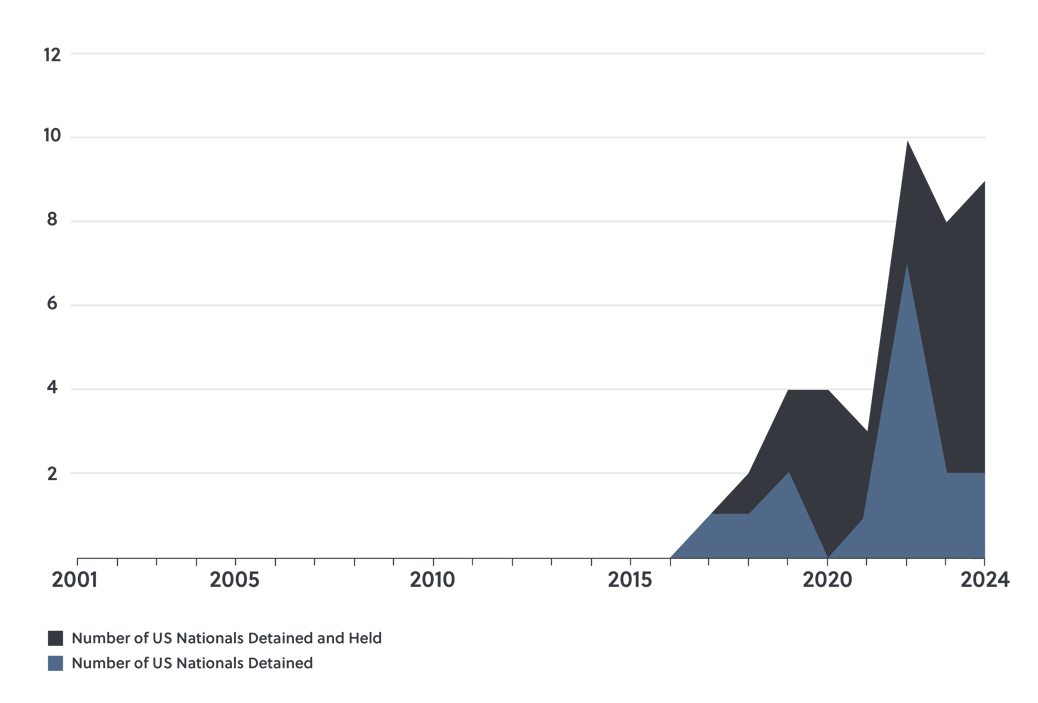Following the historic prisoner exchange between Russia and the US in August, Jameson Lisak examines how the exchange happened despite US-Russia relations being at an all-time low, and why foreign nationals remain at risk of politically motivated detentions in Russia.
On 1 August, on the tarmac of a Turkish airport, Russia and the US conducted the largest exchange of prisoners and detainees between the two sides since the Cold War. Following a year of behind-the-scenes negotiations, the US, in close cooperation with four EU allies, turned over eight Russian prisoners, including Vadim Krasikov, a Russian secret services hitman imprisoned in Germany for the murder of a Georgian national. In return, the US received 16 detainees: three US nationals, five German nationals, and eight Russian dissidents. Among that group were two high profile Americans: Wall Street Journal reporter Evan Gershkovich and former US marine Paul Whelan. The exchange occurs at a low point in modern US-Russian relations, marked by fiery rhetoric and extensive sanctions since Russia's February 2022 invasion of Ukraine.
The Cold War playbook
While the US and Russia both want to ensure that tensions between them do not escalate to actual hostilities, this leaves open a wide range of avenues for antagonism. Russia has continued to rely on a Cold War-era playbook of running undercover agents and disinformation campaigns directed against the US. Recent examples include the April 2024 arrest in Germany of two German-Russian nationals on suspicion of scouting out US military facilities in Germany for sabotage, and the revelation in early September 2024 that Russia spent nearly USD 10 million through a Tennessee-based media company to publish politically divisive and anti-Ukraine content in the US.
However, this also means that Russian undercover assets run the risk of discovery and detention.
Here, Russia faces a good value proposition: with relations with the West already at an all-time low, Russia has little to lose if it can recover high-value assets in exchange for foreign tourists and journalists.’’
According to behind-the-scenes reports of the negotiations, Putin’s desire to secure Krasikov’s release was critical in enabling the exchange. After the exchange, the Kremlin suggested that Krasikov was linked to Putin’s personal guard. The episode demonstrates the high value that Russia places on its national assets, and the lengths it will go to secure their release. As Russian assets are arrested abroad, Moscow will be on the lookout for foreign nationals to detain for future prisoner exchanges. Meanwhile, democratic leaders are under pressure to get their citizens released, and a successful exchange can be a useful political win. US president Joe Biden used the August exchange as a chance to take a swipe at his then opponent Donald Trump, who had previously claimed that he was the only one who could negotiate the release of Gershkovich.
Increasing detentions amid growing civil repression
A number of foreign citizens remain detained in Russia, including as many as 20 Americans. The Foley Foundation, a US NGO that advocates for Americans held hostage abroad, estimates that yearly detentions of Americans in Russia have increased as much as 200 percent since 2021. Some foreign detainees, including Brittney Griner and three other US citizens still in custody, were arrested under Russia’s strict anti-drug laws, while others have been detained for loosely evidenced charges of espionage, as in the cases of Gershkovich and Whelan.
The apparent increase in arrested foreign nationals reflects a deterioration in civil liberties in Russia. According to OVD-Info, a Russian human rights watchdog, Russian authorities have enacted 43 pieces of restrictive legislation since February 2022.’’
Amid a politicised war-time atmosphere, Russian citizens and dual nationals have faced charges of treason or “spreading misinformation about the Russian military,” a charge established by a March 2022 law which carries a penalty of up to 15 years of imprisonment. Alsu Kurmasheva, a dual US-Russia citizen part of the latest trade, was charged under that law in July 2024 and sentenced to six and a half years in prison. She was arrested while visiting family. Russia has also arrested journalists and activists, and others have been prosecuted for posting or sharing anti-war content on social media platforms. In August 2024, Ksenia Khavana, another Russian-American individual, was sentenced to 12 years in prison for charges stemming from a USD 52 donation to a pro-Ukrainian charity.
Western nationals are not the only victims. In March 2024, South Korean national Baek Won-soon was arrested in Russia on suspicion of espionage. Baek was reportedly supporting North Korean labourers working in Russia, and helping them escape.
The costs of a high stakes game
With relations between Russia and the West unlikely to improve any time soon, the Kremlin will use its oppressive legal framework to justify further politically motivated detentions. At the heart of this dynamic are the detainees paying the costly price of becoming increasingly valuable bargaining chips in a high-stakes political game. Consequently, foreign and dual nationals alike will need to ensure they are acutely aware of the current geopolitical climate and up-to-date travel advisories when considering travel to Russia.
Number of US Nationals detained and held in Russia (2001-2024)
Source: The Foley Foundation; data is from 1 January, 2001 to 31 May, 2024.
The 1 August exchange was Washington’s largest with Moscow in the post-Soviet period, but the two countries have conducted three other high-profile prisoner exchanges in recent years, including two in 2022, just months after the full-scale invasion of Ukraine. In 2010, the US exchanged a network of 10 Russian ‘sleeper agents’ for four Russian prisoners accused of being Western spies. In April 2022, the US and Russia traded a former US Marine and a Russian pilot, and in December 2022 the two countries exchanged Russian arms dealer Viktor Bout for US basketballer player Griner in a controversial trade that became politicised in the US. Republican politicians and conservative outlets criticised the perceived mismatch of the exchange, calling it “a gift” to Putin.




